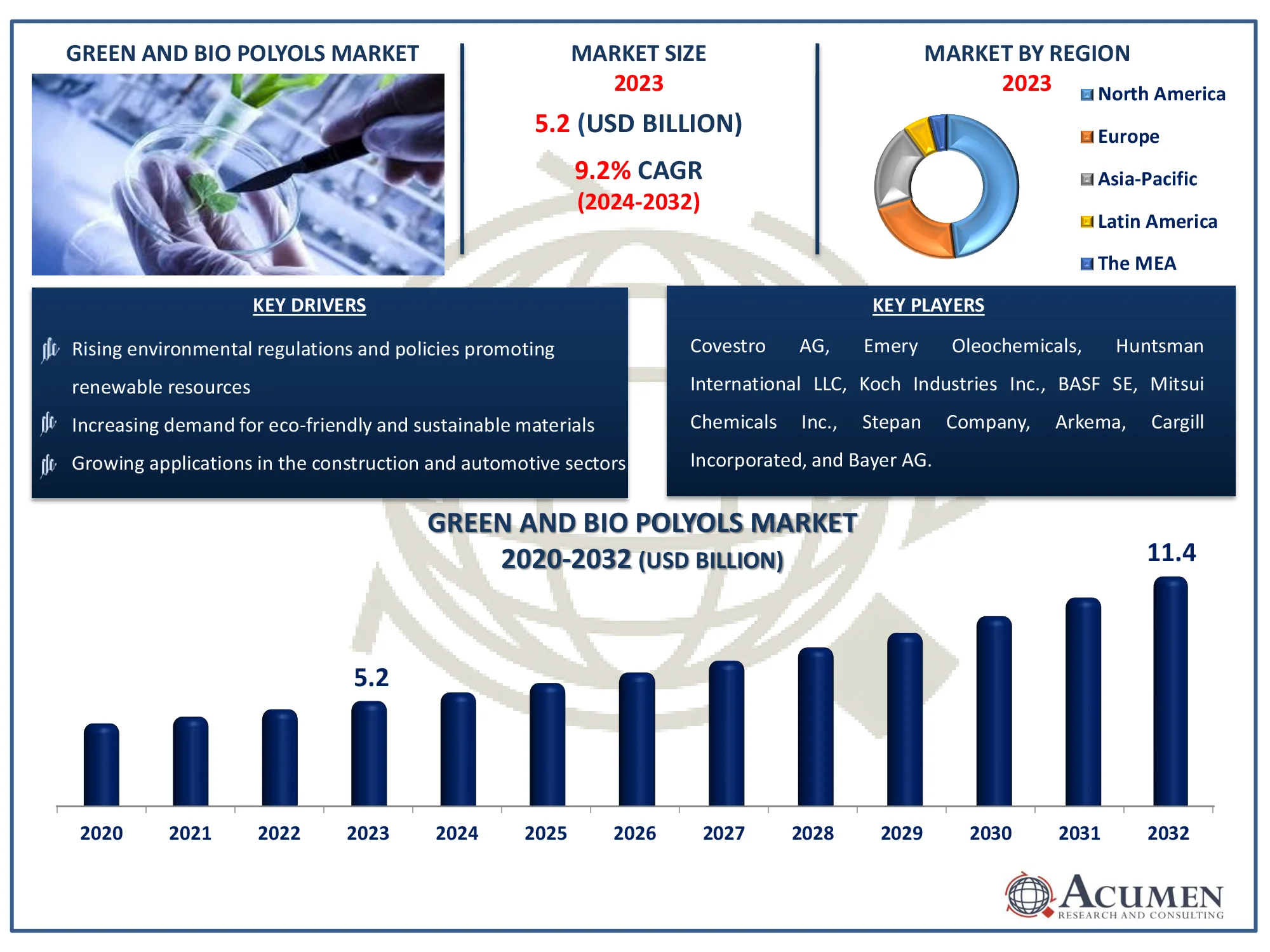March 2025
The Global Green And Bio Polyols Market Size accounted for USD 5.2 Billion in 2023 and is estimated to achieve a market size of USD 11.4 Billion by 2032 growing at a CAGR of 9.2% from 2024 to 2032.
The Global Green And Bio Polyols Market Size accounted for USD 5.2 Billion in 2023 and is estimated to achieve a market size of USD 11.4 Billion by 2032 growing at a CAGR of 9.2% from 2024 to 2032.
Green And Bio Polyols Market Highlights

Green and bio polyols are high-quality bio-based polyols synthesized using renewable materials such as tall oils or rapeseed. The major application of these polyols is in the manufacture of rigid polyurethane foams, which are primarily used for thermal insulation purposes. Polyether polyols represented the largest market segment for green and bio polyols. Polyether polyols find extensive applications in the production of both flexible and rigid polyurethane foams. These foams are widely utilized across various industries, including construction, bedding and furniture, and the automotive sector. Numerous renewable sources are employed in the synthesis of green and bio polyols, highlighting the versatility and sustainability of these materials in modern manufacturing.
Global Green and Bio Polyols Market Dynamics
Market Drivers
Market Restraints
Market Opportunities
Green and Bio Polyols Market Report Coverage
|
Market |
Green And Bio Polyols Market |
|
Green And Bio Polyols Market Size 2023 |
USD 5.2 Billion |
|
Green And Bio Polyols Market Forecast 2032 |
USD 11.4 Billion |
|
Green And Bio Polyols Market CAGR During 2024 - 2032 |
9.2% |
|
Green And Bio Polyols Market Analysis Period |
2020 - 2032 |
|
Green And Bio Polyols Market Base Year |
2023 |
|
Green And Bio Polyols Market Forecast Data |
2024 - 2032 |
|
Segments Covered |
By Type, By Raw Material, By Application, By End-user Industry, and By Geography |
|
Regional Scope |
North America, Europe, Asia Pacific, Latin America, and Middle East & Africa |
|
Key Companies Profiled |
Covestro AG, Emery Oleochemicals, Huntsman International LLC, Koch Industries Inc., BASF SE, Mitsui Chemicals Inc., Stepan Company, Arkema, Cargill Incorporated, and Bayer AG. |
|
Report Coverage |
Market Trends, Drivers, Restraints, Competitive Analysis, Player Profiling, Covid-19 Analysis, Regulation Analysis |
Green And Bio Polyols Market Insights
The primary driving factor for the green and bio polyols market is the rising demand from sectors such as automotive, construction, and others. The growing need for automotive vehicles, the lightweight nature of these materials, and the demand for superior manufacturing materials will fuel market growth during the green and bio polyols industry forecast period. Additionally, the lower cost of polyether polyols compared to alternatives like polyesters further accelerates global market expansion. In recent years, the increasing demand for bio-based products has also supported market growth. Looking ahead, the trend towards sustainability and eco-friendly solutions, motivated by consumer preferences and regulatory efforts to reduce the environmental impact of industrial activities, has greatly boosted the market for green and bio polyols. Their adaptability in various applications, combined with continual advancements in manufacturing methods, ensures widespread adoption across industries. Consequently, the market is positioned for strong development, driven by ongoing innovation and the global push towards greener alternatives.
A significant barrier to the green and bio polyols market is a lack of understanding among individuals in poor countries. Despite the numerous benefits of green and bio polyols, such as environmental sustainability and increased performance, many consumers and businesses in these regions are ignorant of them. This lack of awareness can be attributed to inadequate information availability, weak marketing efforts, and general unfamiliarity with bio-based products. Moreover, developing countries frequently prioritize cost above sustainability, focusing on immediate economic rewards rather than long-term environmental consequences. Without sufficient education and promotion, potential users may continue to utilize traditional, petroleum-based polyols, missing out on the benefits of green and bio polyols. To overcome this barrier, focused awareness efforts, educational activities, and collaboration with local organizations are required. Increasing knowledge and understanding of green and bio polyols in emerging countries can boost market growth and promote a global movement toward more sustainable practices.
Green and Bio Polyols Market Segmentation
The worldwide market for green and bio polyols market is split based on type, raw material, application, end-user industry, and geography.
Green and Bio Polyol Market By Type
According to green and bio polyols industry analysis, the polyether sector is the largest in the market due to its diverse applications and benefits. Polyether polyols are widely utilized in the creation of both flexible and stiff polyurethane foams, which are crucial in industries such as automotive, construction, bedding, and furniture manufacturing. Their advantages include improved moisture resistance, greater flexibility, and reduced cost as compared to polyester polyols. Furthermore, polyether polyols have higher hydrolytic stability and are easier to produce, making them the favored choice for manufacturers. The combination of these variables has resulted in the polyether segment's market domination, serving the diversified demands of many industrial applications and contributing to its leading position.
Green And Bio Polyol Market By Raw Material
The natural oils and their derivatives segment dominate the global industry and it is expected to grow over the green and bio polyols market forecast period due to its eco-friendliness and abundance. These polyols are made from renewable resources such soybean, castor, canola, and palm oils, which greatly reduces dependency on petroleum-based products. Their biodegradability and reduced carbon footprint are consistent with rising environmental restrictions and consumer demand for sustainable products. Furthermore, advances in biotechnology have increased the efficiency and cost-effectiveness of generating polyols from natural oils, making them more appealing to producers. This segment's growth is aided by increased demand in a variety of applications, including flexible foams, coatings, adhesives, and sealants, which contribute to its market domination.
Green And Bio Polyol Market By Application
The PU flexible foam segment commands the largest share in the green and bio polyols market due to its extensive use across multiple industries, particularly in furniture, bedding, automotive interiors, and packaging. The demand for PU flexible foam is driven by its exceptional properties, such as superior comfort, durability, and resilience. Additionally, the shift towards sustainable and eco-friendly materials has accelerated the adoption of bio-based polyols in foam production. This transition is supported by increasing regulatory pressures and consumer awareness regarding environmental impact. Innovations in green polyol formulations have enhanced the performance of PU flexible foams, making them a preferred choice for manufacturers seeking sustainable alternatives without compromising on quality and functionality.
Green And Bio Polyol Market By End-User Industry
The furniture category has the greatest share of the green and bio polyols market due to the increased demand for sustainable and durable materials in the production of furniture products such as mattresses, pillows, and upholstery. Customers are increasingly valuing eco-friendly items, prompting furniture producers to use green and biopolyols. These polyols provide the essential comfort and robustness while lowering their environmental impact. Furthermore, rising disposable incomes and urbanization have resulted in greater furniture spending, driving up demand even further. The industry's emphasis on sustainable methods and materials fits with global environmental trends, bolstering the Furniture segment's dominance in the green and bio polyols market.
Green And Bio Polyols Market Regional Outlook
North America
Europe
Asia-Pacific
Latin America
The Middle East & Africa

Green And Bio Polyols Market Regional Analysis
In terms of green and bio polyols market analysis, North America emerges as the largest region in the global industry, primarily driven by robust demand in the automotive sector and strong government support. The region benefits from a well-developed automotive industry focused on enhancing fuel efficiency and vehicle safety through lighter materials like aluminum alloys. This trend propels the adoption of green and bio polyols for various applications, supporting market growth significantly.
Meanwhile, Asia-Pacific stands out as the fastest-growing region, fueled by expanding production capacities in countries like China and India. The automotive sector in APAC is witnessing substantial growth, contributing significantly to the increased demand for green and bio polyols. Moreover, rising demand across multiple sectors and increasing adoption of eco-friendly coating materials further boost market growth in the region.
Europe follows closely behind North America, driven by substantial investments, growing awareness regarding bio-based products, and the presence of major industry players. In contrast, Latin America, Middle East, and Africa (LAMEA) exhibit steady growth, with the Middle East particularly prominent due to its strong industrial base and high spending power.
Green And Bio Polyols Market Players
Some of the top green polyols and bio polyols market companies offered in our report includes Covestro AG, Emery Oleochemicals, Huntsman International LLC, Koch Industries Inc., BASF SE, Mitsui Chemicals Inc., Stepan Company, Arkema, Cargill Incorporated, and Bayer AG.
Looking for discounts, bulk pricing, or custom solutions? Contact us today at sales@acumenresearchandconsulting.com
March 2025
April 2023
July 2020
November 2021